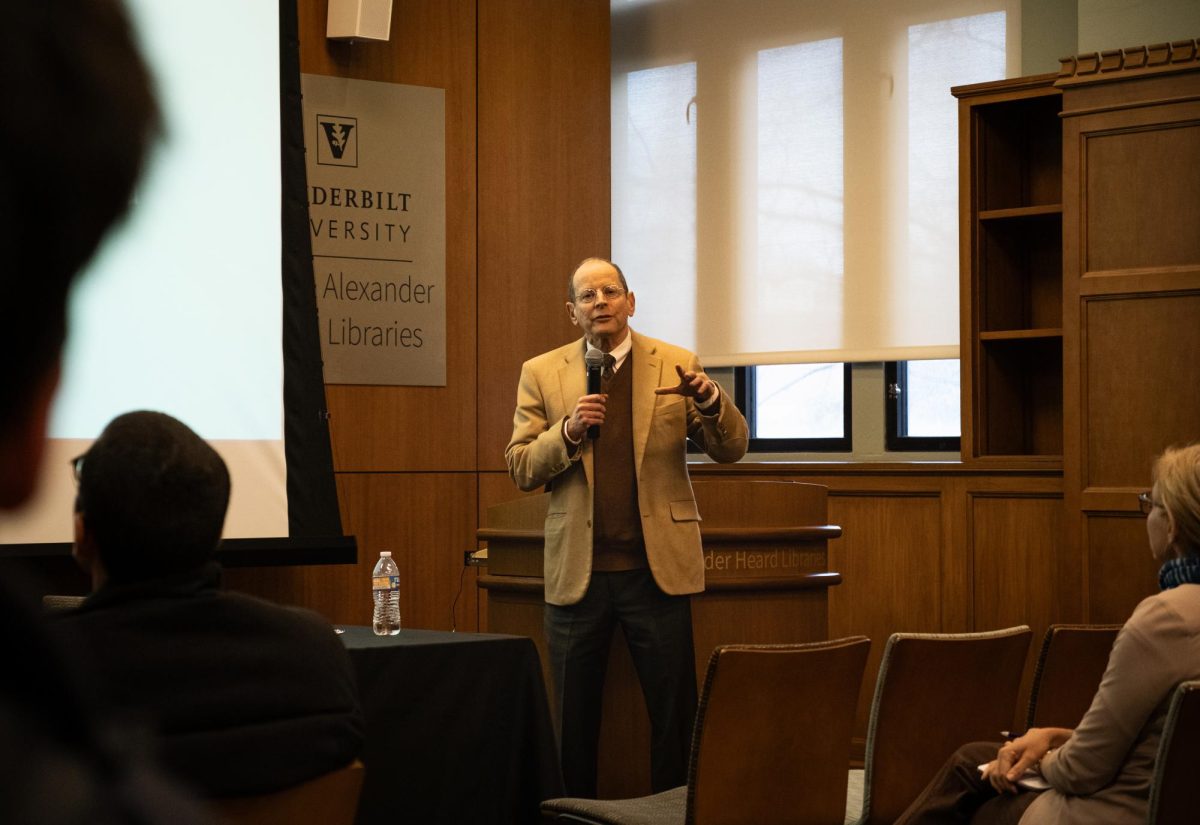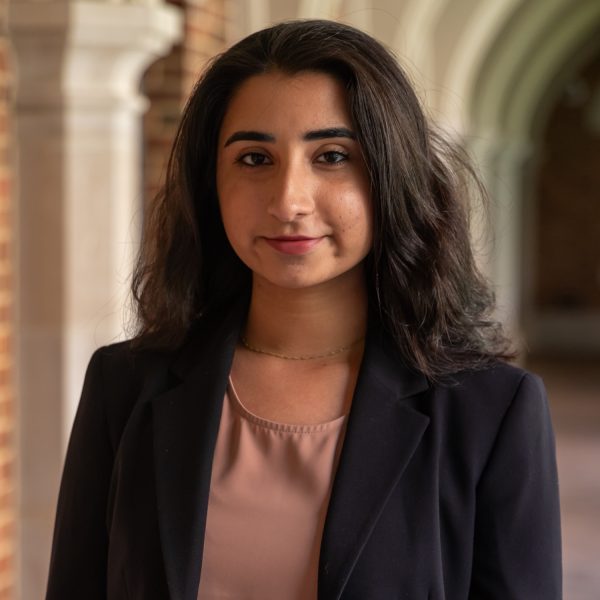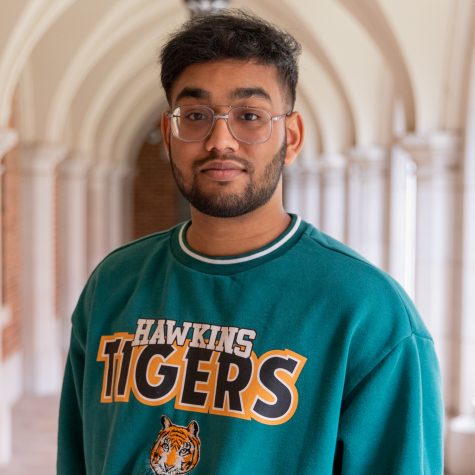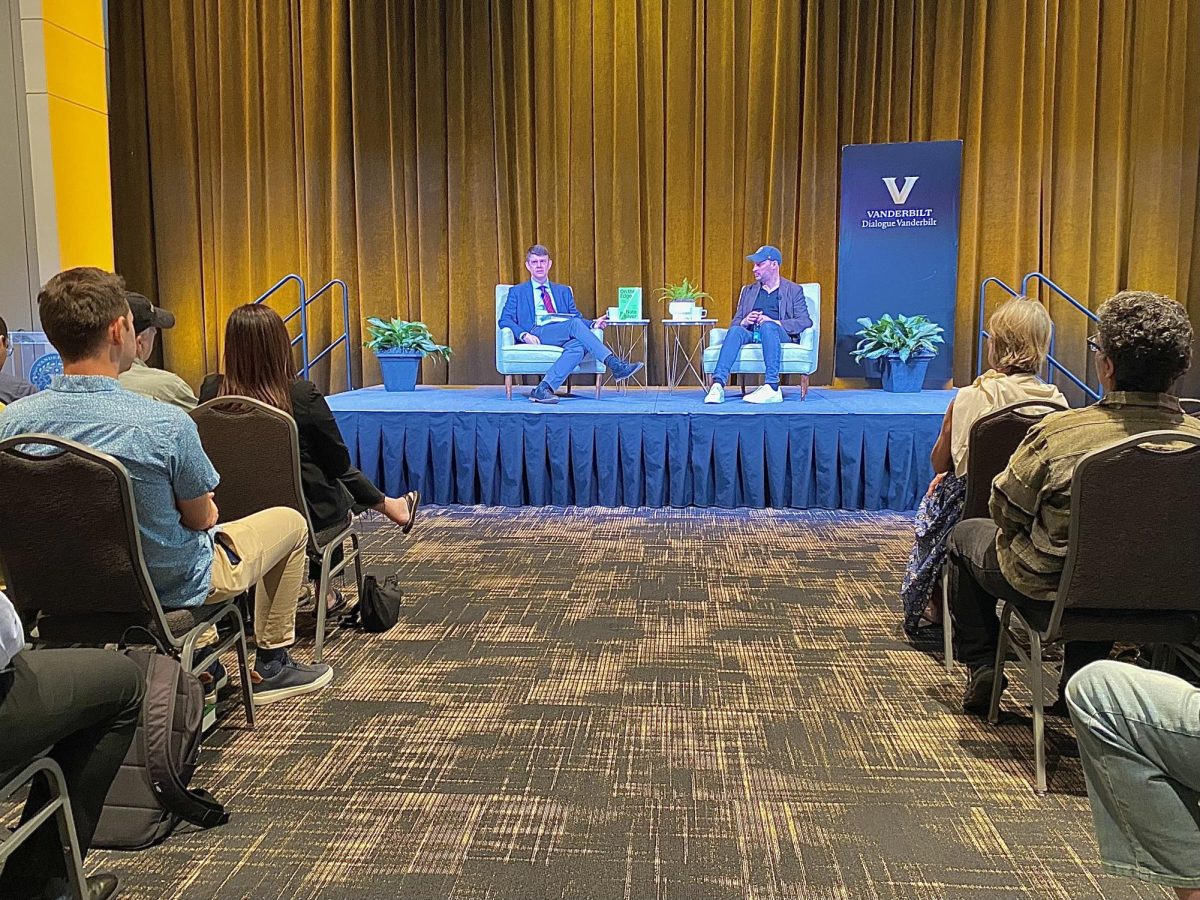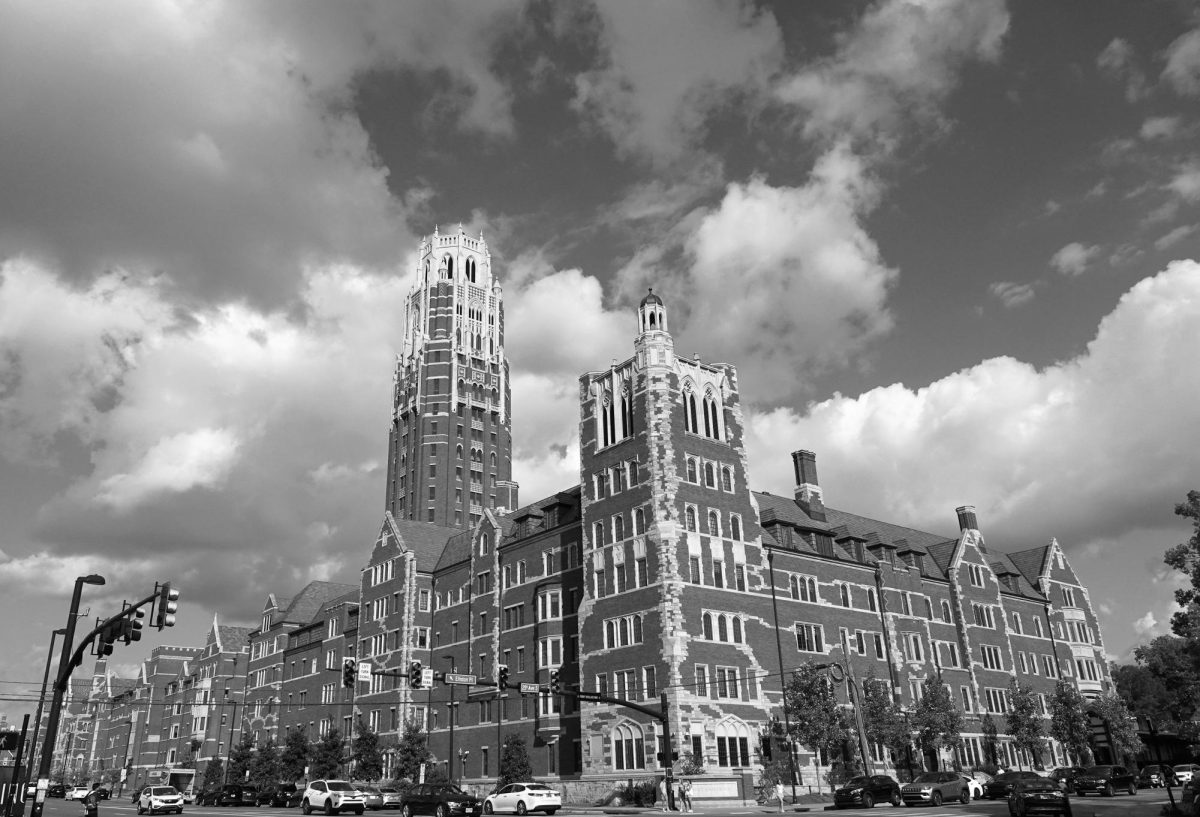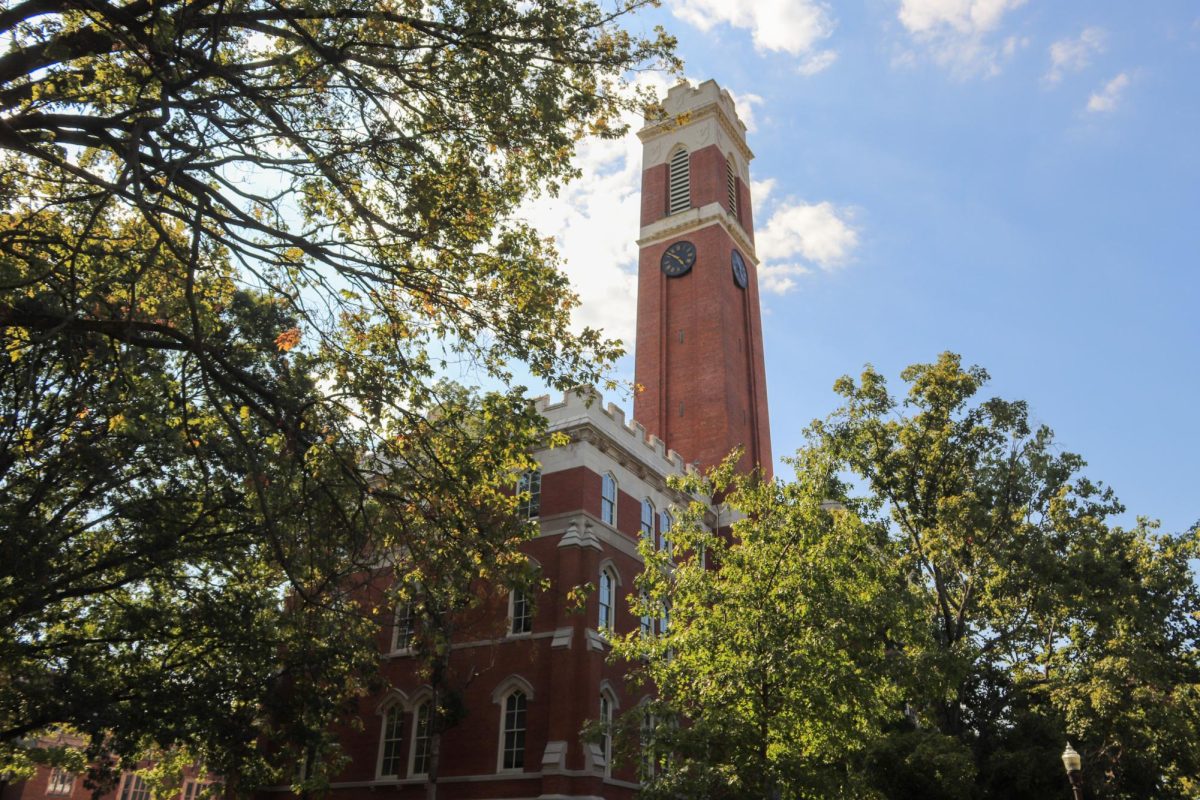Vanderbilt’s Open Dialogue Visiting Fellows program hosted award-winning author Jonathan Rauch on Jan. 22 for a conversation on the intersection of free speech, minority rights and societal well-being. Rauch’s presentation, titled “Why Free Speech is the Only Safe Space for Minorities,” took place in Central Library and was followed by a student-led panel discussion and reception.
Rauch is a distinguished Senior Fellow in Governance Studies at The Brookings Institution, contributing writer for “The Atlantic” and recipient of the 2005 National Magazine Award. Rauch’s most recent book, “The Constitution of Knowledge: A Defense of Truth,” was featured prominently throughout Monday’s discussion.
Consequences of limiting free speech
Using student manifestos from college campuses as recent examples, Rauch first established that he believes calls for curtailing free speech have been misguidedly rooted in a desire to protect and shelter marginalized voices.
“The argument for safety has become a linchpin of thinking on and off campuses,” Rauch said. “The notion here is that harmful, hateful, hurtful speech is a form of violence and thus a human rights violation.”
Rauch said he is concerned that this idea is not only affecting the climate of college campuses but is also impacting fields such as science.
“We now see this kind of thinking in academic journals as well,” Rauch said. “Nature Human Behavior — which is a leading journal — just last year, published new standards in which they reserve the right to refuse publication or retract post-publication submissions that embody singular privilege perspectives. Now, this is not a standard scientific criteria.”
Rauch added that his concerns extend beyond the scope of academia. He cited Knight Foundation polls indicating that in the past decade, more individuals feel their campus climate is less conducive to free expression.
“This is a little bit heartbreaking because universities are supposed to be the place of all places for folks to feel that they can engage in robust discourse and experiment with controversial ideas,” Rauch said. “That is why we are here.”
Rauch also noted that limitations on free speech impact individuals on both sides of the political aisle.
“Progressives and conservatives are worried about losing their job or job opportunities because they speak candidly and openly about their views,” Rauch said. “That is a high degree of chilling, and it means a lot of us are feeling frightened in America.”
Defending free speech
Rauch provided a brief overview of free speech theory, which maintains that the four rudimentary defenses of speech are knowledge, freedom, efficacy and power. Rauch said that, while these components are fundamental, his purpose in visiting Vanderbilt was to discuss an additional, underemphasized defense of free speech — social justice.
“I am here to tell you that free speech, free inquiry, including offensive, bigoted and yes, sometimes hateful speech, allowing that is the most important thing we can do for social justice,” Rauch said.
To support his argument, Rauch referenced notable abolitionists and civil rights leaders that called for unequivocal freedom of expression, including Hosea Williams, a civil rights leader and activist. In a video clip shown by Rauch, Williams notably defended the free speech rights of the Ku Klux Klan on the premise that stripping one group of their free speech rights puts other groups — like the National Association for the Advancement of Colored People — at risk of losing their freedoms as well.
Rauch acknowledged the moral underpinnings that typically spur hate speech bans but maintained that these bans are far from effective.
“The main reason that people support hate speech bans is, of course, that they oppose hate,” Rauch said. “They thus oppose the expression of hate, but these two things are not the same. Solving hate by banning hate speech is like solving global warming by breaking all the thermometers. All it does is make the hate harder to hear, harder to identify, harder to confront, harder to root out.”
Rauch also harped on the popular adage that “words are not violence.”
“The attempt to equate words with violence is an attempt to make words violent, and it is an attempt to stigmatize criticism, which inevitably involves offense,” Rauch said.
According to Rauch, hate speech bans perpetuate the stereotype that minorities are weak. Instead of conforming to this stereotype, Rauch says minorities should embrace the difficult task of social justice work and view the role of the moral educator as a privilege, not a burden.
“Never forget, minorities are always better off in a society that protects hate speech than a society that protects us from hate speech,” Rauch said.
Getting personal
To further his argument about why states and authorities should not censor free speech, Rauch discussed in-depth a time period where LGBTQ+ voices were struggling to be heard as a result of government suppression. Rauch told the audience that this conversion was personal because he identifies as a member of the LGBTQ+ community. In his presentation, he shared stories of individuals facing discrimination for their sexual orientation during the mid-20th century.
“This is what was known as the Lavender Scare,” Rauch said. “It’s a massive campaign by the federal government and also the state and local governments to purge their civil services of homosexuals who at the time were called deviants.”
Rauch gave the example of Frank Kameny, a Harvard-educated astronomer and WWII veteran who was fired from the U.S. Army Map Service for being gay. Kameny devoted years of his life to challenging authorities and institutions that curtailed his First Amendment rights.
“Frank Kameny was the most important gay and lesbian civil rights activist of the 20th century,” Rauch said. “It’s a shame he’s not more widely known.”
Rauch used personal anecdotes alongside details of Kameny’s life and legacy to illustrate how he believed the state wrongfully suppressed freedom of expression on the grounds of protecting society from the perceived threat of homosexuality.
“Canceling was invented in America and refined on homosexuals,” Rauch said. “We were the people who were deplatformed, fired, silenced, driven out of public view, driven into the closet. We have not been fighting all those years so that we could then turn the tables and do the same thing. We were fighting for the opportunity of all Americans, yes, including bigoted and offensive Americans to live as their own true, authentic selves.”
Student panel discussion and audience Q&A
After the lecture portion of the event, student ambassadors for the Open Dialogue Visiting Fellows program sat down with Rauch and posed questions of their own to the author. The student panelists were junior Brina Ratangee, senior Ari Sasson and first-year Katie Tully. Ratangee is the current News Editor for The Hustler.
Tully asked Rauch how schools like Vanderbilt should practically approach the challenge of fostering intellectual diversity on campus. Rauch responded that universities should make intellectual diversity a part of their hiring process, but that the responsibility for creating an environment to do so also falls upon the student body.
“I also think students have a role by being outspokenly interested in hearing points of view that may be unorthodox on campus, welcoming and engaging with speakers who may be conservative or Evangelical or whatever the role may be,” Rauch said. “If students demand to hear those people, if they want those voices in their departments, they will get them.”
Sasson brought up a personal experience in which he was peer pressured into backing away from moderating a controversial debate on campus. Sasson asked Rauch for advice on how students should approach backlash and controversy to free expression.
“It’s not what you say in response, it’s that you keep saying,” Rauch said. “When someone comes in and says to you, ‘shut up or be marginalized in the conversation,’ ignore them. Find your voice, and keep talking. Don’t let yourself be intimidated or bullied because later you’ll regret it if you are.”
Following the panel discussion, audience members were invited to ask questions of their own. Maya Levinson, a senior, asked Rauch whether he believes there should be hard and fast limits to hate speech.
“The good news is that we have a very well developed, stable and widely understood body of jurisprudence,” Rauch said. “On First Amendment law, we set some pretty good guidelines, and though they don’t apply to Vanderbilt, which is a private university, the concepts in them are very good and very, as I said, very well understood and stable.”
Junior Keyonté Doughty, an Open Dialogue Student Ambassador, helped set up Monday’s event. Doughty said that while he did not agree with everything that Rauch said, attending the talk was still a valuable experience.
“The whole purpose of this fellowship is to foster these conversations,” Doughty said. “I think one way to voice your concerns or to voice yourself is to come to the events. If you don’t agree with the speaker, come and challenge them from their standpoints and things like that, or come and learn, like in the whole purpose of civil discourse.”

